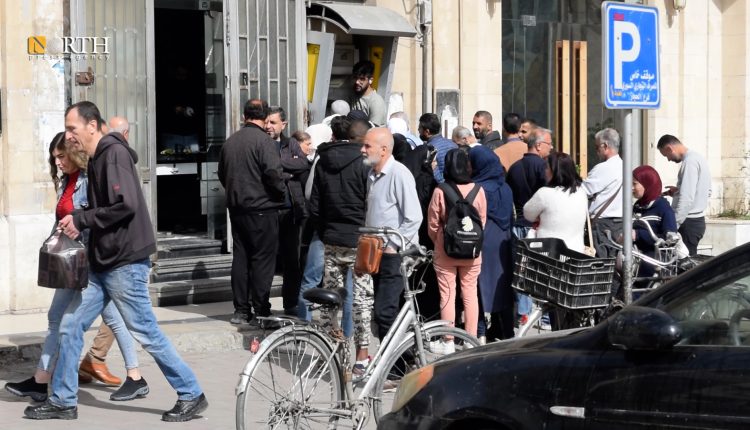By Norman al-Abbas
DAMASCUS, Syria (North Press) – Syria’s banking sector is grappling with mounting challenges that have deepened due to economic sanctions, making it one of the most affected sectors in a volatile economic environment.
Sanctions have become more than just legal restrictions; they now pose daily obstacles to investment flows and market recovery, according to local traders.
Sanctions and investment
Fadi Anjou, a resident of Damascus, told North Press, “Sanctions on the banking sector have paralyzed investment in the country. Lifting them is essential for investors and traders abroad to return and reinvest.”
Anjou urges the transitional government to listen directly to investors both inside and outside the country, stressing that they can genuinely contribute to improving the economic situation.
However, he also points to an internal problem in the banking sector, stating, “Those working in the banking sector today lack experience, and the older, experienced staff is no longer present.”
Suleiman Abdullah also believes that sanctions have “exhausted the Syrian economy” and closed the doors to investment at a time when people are suffering from low incomes and the aftermath of war.
He told North Press, “Lifting the sanctions is a necessary step to improve the economic reality.”
Mohammed Abdel Majid, who works in the commercial sector, notes that “the people are the ones paying the price in the end.”
He explains that sanctions have caused real suffering for traders and investors, adding, “Fear of these sanctions is what prevents many from returning to the Syrian market.”
Meanwhile, Abdul Razzaq Hassani, a professor at the Faculty of Economics at the University of Damascus, emphasizes that the Syrian banking sector does not operate in isolation from the global financial system. A significant part of its activity involves international operations, such as attracting capital to finance investments and facilitating import/export transactions.
He adds that these operations go through the global SWIFT system, making the continuation of sanctions a real obstacle to carrying out these vital financial activities.
Last month, the UK Foreign Office removed 24 Syrian entities from its sanctions list, including the Central Bank and several other banks and oil companies. It stated that these entities were no longer subject to asset freezes.
Banking sector decline
Throughout the al-Assad family’s rule (1970–2024), the public banking sector has suffered from structural imbalances, despite some modernization efforts. It largely remained constrained by its role as a provider of government services.
Syria’s public banking sector consists of six state-owned banks, the oldest being the Agricultural Cooperative Bank founded in 1888, along with three modern banks (commercial, industrial, and real estate) and two banks for lending and personal finance.
There are also 11 private banks and 4 Islamic banks established between 2004 and 2023, after the al-Assad regime legalized private banking and allowed foreign bank licenses in December 2002 under a law permitting the creation of private and joint banks.
Hassani believes the decline of the banking sector is not solely due to sanctions but also internal factors, including weak management, lack of expertise in public banks, administrative stagnation, and the absence of modern economic thinking—where the “government mentality” still dominates.
He notes that banking in Syria suffers from poor expertise, low wages, and outdated software systems directly affected by sanctions.
He adds that the limited capital in most banks—except for Islamic banks—hinders the implementation of large investment or financing projects.
Hassani also points to financial and administrative corruption in the sector, especially in the issue of large loans granted to influential businessmen.
Trust and investment attraction
Hassani says that public trust in the banking sector remains weak. “When you deposit a large amount in the bank, you’re restricted to a daily withdrawal limit of just a few million. Any attempt to withdraw a significant amount requires Central Bank approval,” he explains, adding that this restriction, “without a clear plan or public justification, has eroded public trust.”
Regarding trust from Arab or expatriate Syrian investors, Hassani sees sanctions as the main barrier. “You cannot talk about attracting investment without a clear plan from the government and the Central Bank, in coordination with the Investment Authority and even some Western countries if exemptions exist.”
He warns that bypassing sanctions, as has happened in the past, could increase transaction costs or lead to additional sanctions from international bodies like the Financial Action Task Force (FATF).
This challenge, he says, requires a decisive response from the government and banking authorities, emphasizing the importance of continuing to demand the lifting of sanctions to rebuild trust in the Syrian banking sector.
He stresses that the transitional government must develop a transparent financial and banking policy to attract investments again.
At the end of March, Reuters quoted former Central Bank Governor Maysa Sabreen as saying that the Central Bank is in the process of restructuring state-owned banks and expanding Islamic banking services by allowing traditional banks to open Islamic branches, given that many Syrians avoid conventional banking services.
According to Reuters, a draft amendment to the Central Bank law is being prepared to enhance the bank’s independence, including granting it more freedom in making monetary policy decisions.

